Hotel Handbook for Intercultural Competence
VerifiedAdded on 2023/01/09
|9
|2898
|44
AI Summary
This hotel handbook explores the importance of intercultural competence in the hotel industry, focusing on Marriott International in India and the UK. It discusses the challenges of serving customers from different cultures and provides recommendations for managers to enhance cross-cultural understanding and improve customer satisfaction.
Contribute Materials
Your contribution can guide someone’s learning journey. Share your
documents today.
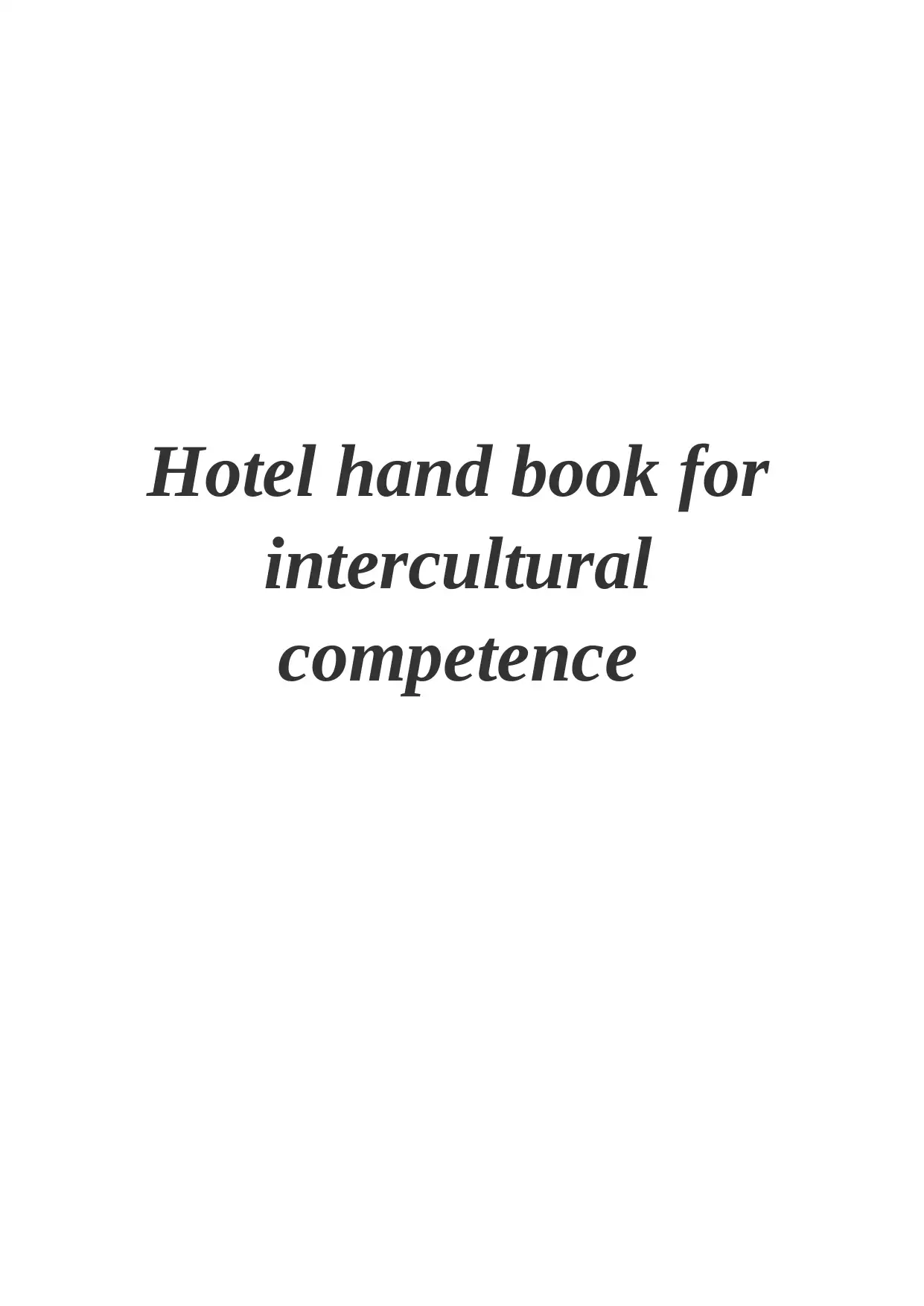
Hotel hand book for
intercultural
competence
intercultural
competence
Secure Best Marks with AI Grader
Need help grading? Try our AI Grader for instant feedback on your assignments.

INTRODUCTION...............................................................................................................................3
MAIN BODY.......................................................................................................................................3
CONCLUSION....................................................................................................................................7
REFERENCES....................................................................................................................................8
MAIN BODY.......................................................................................................................................3
CONCLUSION....................................................................................................................................7
REFERENCES....................................................................................................................................8
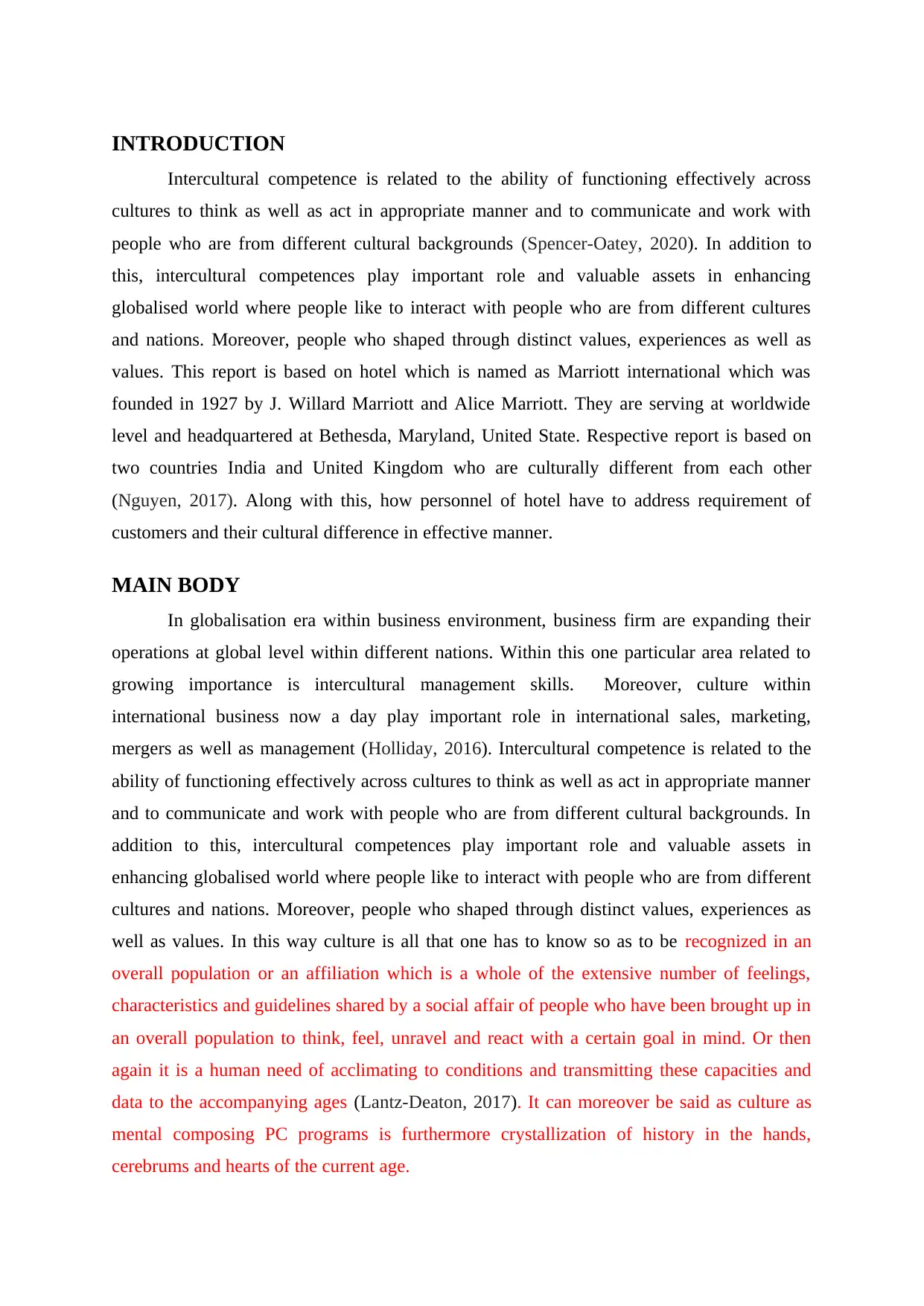
INTRODUCTION
Intercultural competence is related to the ability of functioning effectively across
cultures to think as well as act in appropriate manner and to communicate and work with
people who are from different cultural backgrounds (Spencer-Oatey, 2020). In addition to
this, intercultural competences play important role and valuable assets in enhancing
globalised world where people like to interact with people who are from different cultures
and nations. Moreover, people who shaped through distinct values, experiences as well as
values. This report is based on hotel which is named as Marriott international which was
founded in 1927 by J. Willard Marriott and Alice Marriott. They are serving at worldwide
level and headquartered at Bethesda, Maryland, United State. Respective report is based on
two countries India and United Kingdom who are culturally different from each other
(Nguyen, 2017). Along with this, how personnel of hotel have to address requirement of
customers and their cultural difference in effective manner.
MAIN BODY
In globalisation era within business environment, business firm are expanding their
operations at global level within different nations. Within this one particular area related to
growing importance is intercultural management skills. Moreover, culture within
international business now a day play important role in international sales, marketing,
mergers as well as management (Holliday, 2016). Intercultural competence is related to the
ability of functioning effectively across cultures to think as well as act in appropriate manner
and to communicate and work with people who are from different cultural backgrounds. In
addition to this, intercultural competences play important role and valuable assets in
enhancing globalised world where people like to interact with people who are from different
cultures and nations. Moreover, people who shaped through distinct values, experiences as
well as values. In this way culture is all that one has to know so as to be recognized in an
overall population or an affiliation which is a whole of the extensive number of feelings,
characteristics and guidelines shared by a social affair of people who have been brought up in
an overall population to think, feel, unravel and react with a certain goal in mind. Or then
again it is a human need of acclimating to conditions and transmitting these capacities and
data to the accompanying ages (Lantz-Deaton, 2017). It can moreover be said as culture as
mental composing PC programs is furthermore crystallization of history in the hands,
cerebrums and hearts of the current age.
Intercultural competence is related to the ability of functioning effectively across
cultures to think as well as act in appropriate manner and to communicate and work with
people who are from different cultural backgrounds (Spencer-Oatey, 2020). In addition to
this, intercultural competences play important role and valuable assets in enhancing
globalised world where people like to interact with people who are from different cultures
and nations. Moreover, people who shaped through distinct values, experiences as well as
values. This report is based on hotel which is named as Marriott international which was
founded in 1927 by J. Willard Marriott and Alice Marriott. They are serving at worldwide
level and headquartered at Bethesda, Maryland, United State. Respective report is based on
two countries India and United Kingdom who are culturally different from each other
(Nguyen, 2017). Along with this, how personnel of hotel have to address requirement of
customers and their cultural difference in effective manner.
MAIN BODY
In globalisation era within business environment, business firm are expanding their
operations at global level within different nations. Within this one particular area related to
growing importance is intercultural management skills. Moreover, culture within
international business now a day play important role in international sales, marketing,
mergers as well as management (Holliday, 2016). Intercultural competence is related to the
ability of functioning effectively across cultures to think as well as act in appropriate manner
and to communicate and work with people who are from different cultural backgrounds. In
addition to this, intercultural competences play important role and valuable assets in
enhancing globalised world where people like to interact with people who are from different
cultures and nations. Moreover, people who shaped through distinct values, experiences as
well as values. In this way culture is all that one has to know so as to be recognized in an
overall population or an affiliation which is a whole of the extensive number of feelings,
characteristics and guidelines shared by a social affair of people who have been brought up in
an overall population to think, feel, unravel and react with a certain goal in mind. Or then
again it is a human need of acclimating to conditions and transmitting these capacities and
data to the accompanying ages (Lantz-Deaton, 2017). It can moreover be said as culture as
mental composing PC programs is furthermore crystallization of history in the hands,
cerebrums and hearts of the current age.
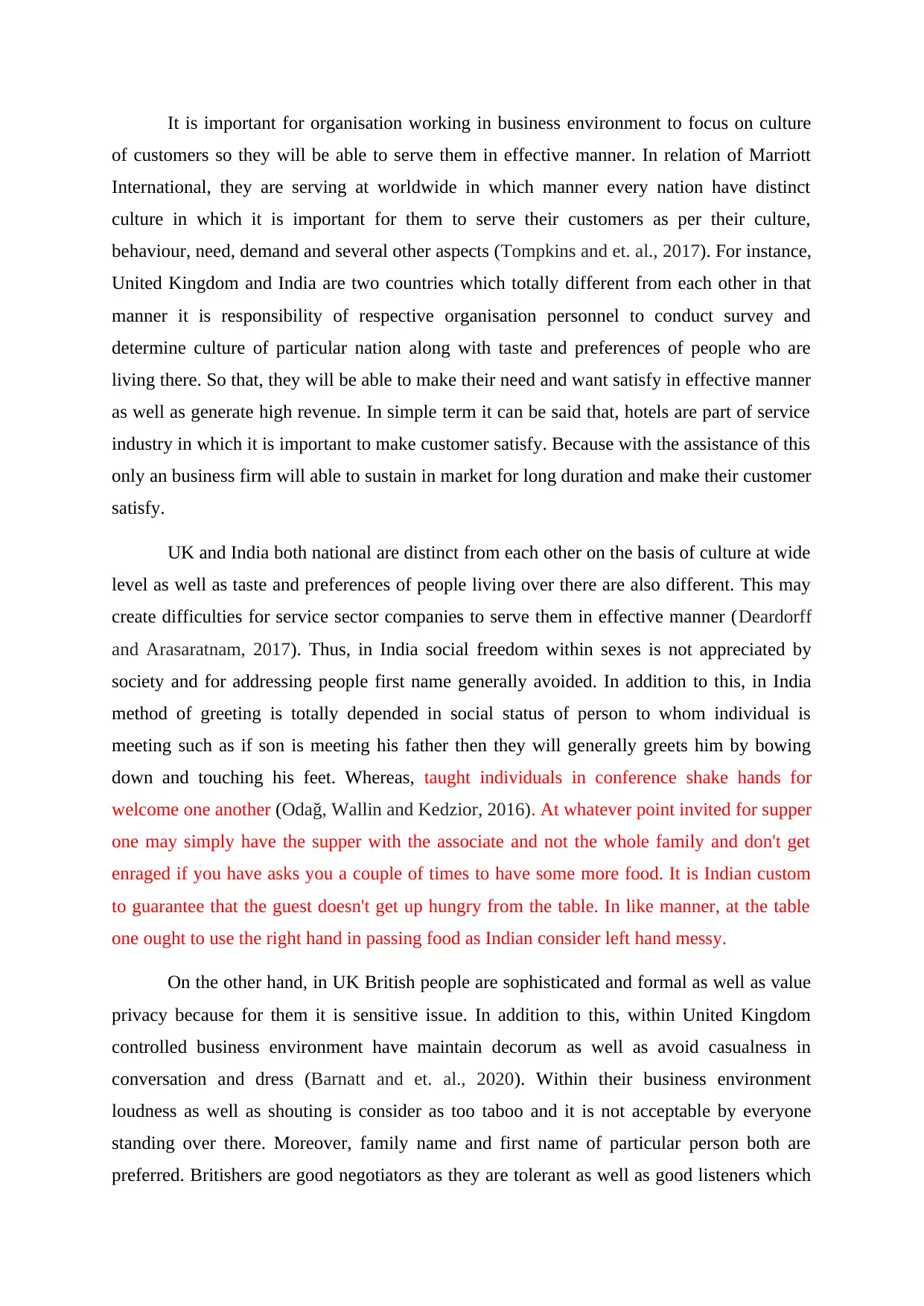
It is important for organisation working in business environment to focus on culture
of customers so they will be able to serve them in effective manner. In relation of Marriott
International, they are serving at worldwide in which manner every nation have distinct
culture in which it is important for them to serve their customers as per their culture,
behaviour, need, demand and several other aspects (Tompkins and et. al., 2017). For instance,
United Kingdom and India are two countries which totally different from each other in that
manner it is responsibility of respective organisation personnel to conduct survey and
determine culture of particular nation along with taste and preferences of people who are
living there. So that, they will be able to make their need and want satisfy in effective manner
as well as generate high revenue. In simple term it can be said that, hotels are part of service
industry in which it is important to make customer satisfy. Because with the assistance of this
only an business firm will able to sustain in market for long duration and make their customer
satisfy.
UK and India both national are distinct from each other on the basis of culture at wide
level as well as taste and preferences of people living over there are also different. This may
create difficulties for service sector companies to serve them in effective manner (Deardorff
and Arasaratnam, 2017). Thus, in India social freedom within sexes is not appreciated by
society and for addressing people first name generally avoided. In addition to this, in India
method of greeting is totally depended in social status of person to whom individual is
meeting such as if son is meeting his father then they will generally greets him by bowing
down and touching his feet. Whereas, taught individuals in conference shake hands for
welcome one another (Odağ, Wallin and Kedzior, 2016). At whatever point invited for supper
one may simply have the supper with the associate and not the whole family and don't get
enraged if you have asks you a couple of times to have some more food. It is Indian custom
to guarantee that the guest doesn't get up hungry from the table. In like manner, at the table
one ought to use the right hand in passing food as Indian consider left hand messy.
On the other hand, in UK British people are sophisticated and formal as well as value
privacy because for them it is sensitive issue. In addition to this, within United Kingdom
controlled business environment have maintain decorum as well as avoid casualness in
conversation and dress (Barnatt and et. al., 2020). Within their business environment
loudness as well as shouting is consider as too taboo and it is not acceptable by everyone
standing over there. Moreover, family name and first name of particular person both are
preferred. Britishers are good negotiators as they are tolerant as well as good listeners which
of customers so they will be able to serve them in effective manner. In relation of Marriott
International, they are serving at worldwide in which manner every nation have distinct
culture in which it is important for them to serve their customers as per their culture,
behaviour, need, demand and several other aspects (Tompkins and et. al., 2017). For instance,
United Kingdom and India are two countries which totally different from each other in that
manner it is responsibility of respective organisation personnel to conduct survey and
determine culture of particular nation along with taste and preferences of people who are
living there. So that, they will be able to make their need and want satisfy in effective manner
as well as generate high revenue. In simple term it can be said that, hotels are part of service
industry in which it is important to make customer satisfy. Because with the assistance of this
only an business firm will able to sustain in market for long duration and make their customer
satisfy.
UK and India both national are distinct from each other on the basis of culture at wide
level as well as taste and preferences of people living over there are also different. This may
create difficulties for service sector companies to serve them in effective manner (Deardorff
and Arasaratnam, 2017). Thus, in India social freedom within sexes is not appreciated by
society and for addressing people first name generally avoided. In addition to this, in India
method of greeting is totally depended in social status of person to whom individual is
meeting such as if son is meeting his father then they will generally greets him by bowing
down and touching his feet. Whereas, taught individuals in conference shake hands for
welcome one another (Odağ, Wallin and Kedzior, 2016). At whatever point invited for supper
one may simply have the supper with the associate and not the whole family and don't get
enraged if you have asks you a couple of times to have some more food. It is Indian custom
to guarantee that the guest doesn't get up hungry from the table. In like manner, at the table
one ought to use the right hand in passing food as Indian consider left hand messy.
On the other hand, in UK British people are sophisticated and formal as well as value
privacy because for them it is sensitive issue. In addition to this, within United Kingdom
controlled business environment have maintain decorum as well as avoid casualness in
conversation and dress (Barnatt and et. al., 2020). Within their business environment
loudness as well as shouting is consider as too taboo and it is not acceptable by everyone
standing over there. Moreover, family name and first name of particular person both are
preferred. Britishers are good negotiators as they are tolerant as well as good listeners which
Secure Best Marks with AI Grader
Need help grading? Try our AI Grader for instant feedback on your assignments.
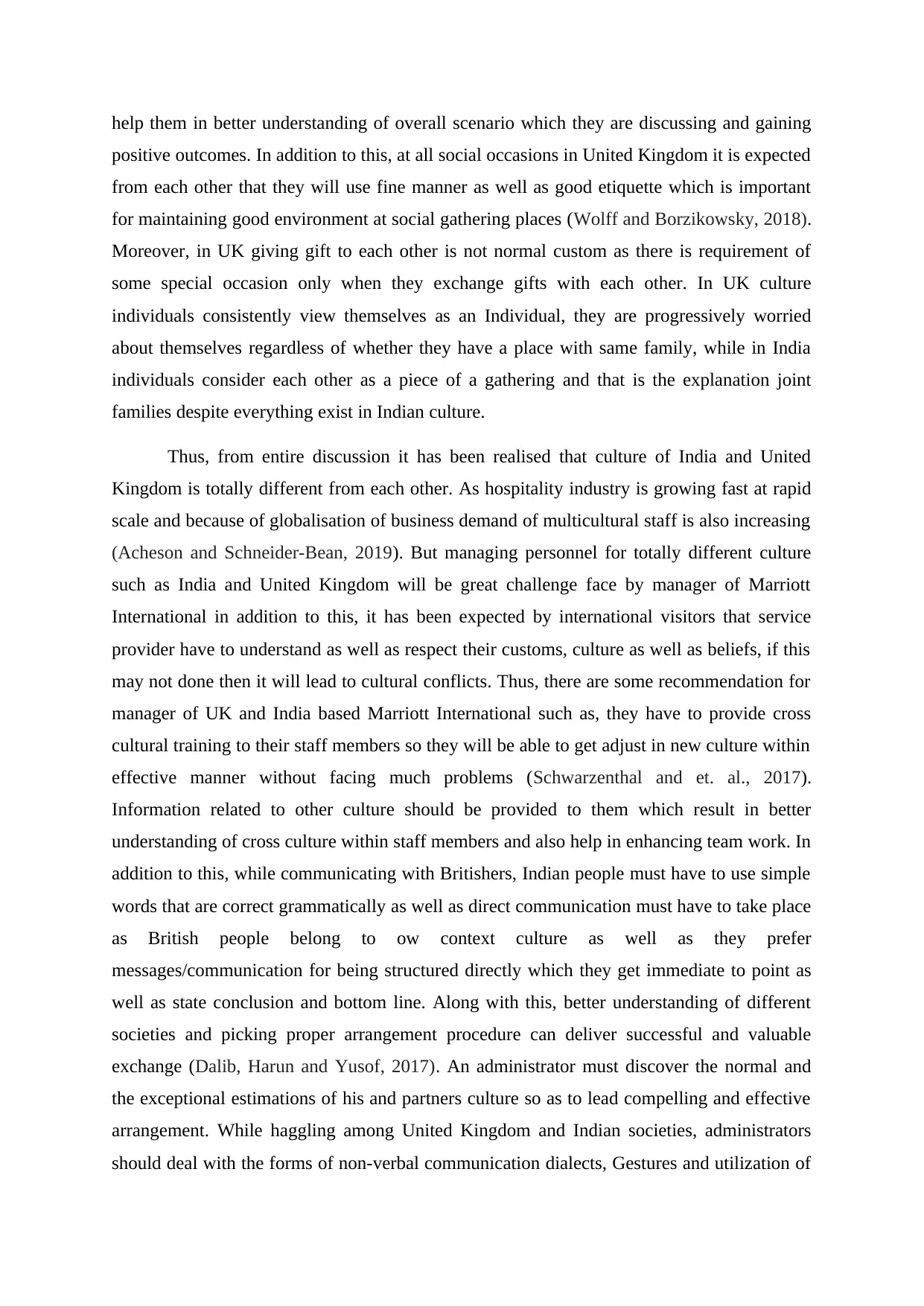
help them in better understanding of overall scenario which they are discussing and gaining
positive outcomes. In addition to this, at all social occasions in United Kingdom it is expected
from each other that they will use fine manner as well as good etiquette which is important
for maintaining good environment at social gathering places (Wolff and Borzikowsky, 2018).
Moreover, in UK giving gift to each other is not normal custom as there is requirement of
some special occasion only when they exchange gifts with each other. In UK culture
individuals consistently view themselves as an Individual, they are progressively worried
about themselves regardless of whether they have a place with same family, while in India
individuals consider each other as a piece of a gathering and that is the explanation joint
families despite everything exist in Indian culture.
Thus, from entire discussion it has been realised that culture of India and United
Kingdom is totally different from each other. As hospitality industry is growing fast at rapid
scale and because of globalisation of business demand of multicultural staff is also increasing
(Acheson and Schneider-Bean, 2019). But managing personnel for totally different culture
such as India and United Kingdom will be great challenge face by manager of Marriott
International in addition to this, it has been expected by international visitors that service
provider have to understand as well as respect their customs, culture as well as beliefs, if this
may not done then it will lead to cultural conflicts. Thus, there are some recommendation for
manager of UK and India based Marriott International such as, they have to provide cross
cultural training to their staff members so they will be able to get adjust in new culture within
effective manner without facing much problems (Schwarzenthal and et. al., 2017).
Information related to other culture should be provided to them which result in better
understanding of cross culture within staff members and also help in enhancing team work. In
addition to this, while communicating with Britishers, Indian people must have to use simple
words that are correct grammatically as well as direct communication must have to take place
as British people belong to ow context culture as well as they prefer
messages/communication for being structured directly which they get immediate to point as
well as state conclusion and bottom line. Along with this, better understanding of different
societies and picking proper arrangement procedure can deliver successful and valuable
exchange (Dalib, Harun and Yusof, 2017). An administrator must discover the normal and
the exceptional estimations of his and partners culture so as to lead compelling and effective
arrangement. While haggling among United Kingdom and Indian societies, administrators
should deal with the forms of non-verbal communication dialects, Gestures and utilization of
positive outcomes. In addition to this, at all social occasions in United Kingdom it is expected
from each other that they will use fine manner as well as good etiquette which is important
for maintaining good environment at social gathering places (Wolff and Borzikowsky, 2018).
Moreover, in UK giving gift to each other is not normal custom as there is requirement of
some special occasion only when they exchange gifts with each other. In UK culture
individuals consistently view themselves as an Individual, they are progressively worried
about themselves regardless of whether they have a place with same family, while in India
individuals consider each other as a piece of a gathering and that is the explanation joint
families despite everything exist in Indian culture.
Thus, from entire discussion it has been realised that culture of India and United
Kingdom is totally different from each other. As hospitality industry is growing fast at rapid
scale and because of globalisation of business demand of multicultural staff is also increasing
(Acheson and Schneider-Bean, 2019). But managing personnel for totally different culture
such as India and United Kingdom will be great challenge face by manager of Marriott
International in addition to this, it has been expected by international visitors that service
provider have to understand as well as respect their customs, culture as well as beliefs, if this
may not done then it will lead to cultural conflicts. Thus, there are some recommendation for
manager of UK and India based Marriott International such as, they have to provide cross
cultural training to their staff members so they will be able to get adjust in new culture within
effective manner without facing much problems (Schwarzenthal and et. al., 2017).
Information related to other culture should be provided to them which result in better
understanding of cross culture within staff members and also help in enhancing team work. In
addition to this, while communicating with Britishers, Indian people must have to use simple
words that are correct grammatically as well as direct communication must have to take place
as British people belong to ow context culture as well as they prefer
messages/communication for being structured directly which they get immediate to point as
well as state conclusion and bottom line. Along with this, better understanding of different
societies and picking proper arrangement procedure can deliver successful and valuable
exchange (Dalib, Harun and Yusof, 2017). An administrator must discover the normal and
the exceptional estimations of his and partners culture so as to lead compelling and effective
arrangement. While haggling among United Kingdom and Indian societies, administrators
should deal with the forms of non-verbal communication dialects, Gestures and utilization of
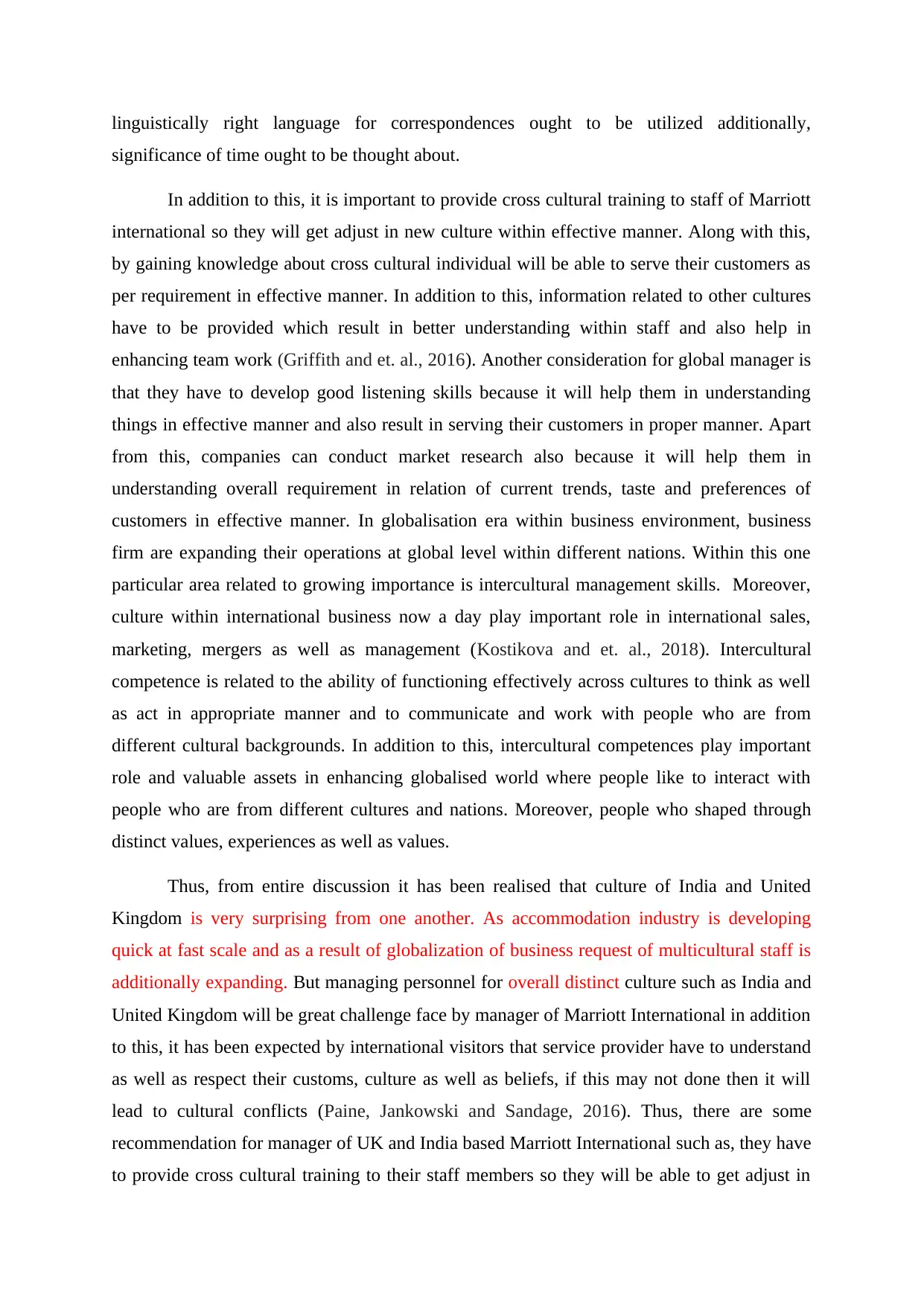
linguistically right language for correspondences ought to be utilized additionally,
significance of time ought to be thought about.
In addition to this, it is important to provide cross cultural training to staff of Marriott
international so they will get adjust in new culture within effective manner. Along with this,
by gaining knowledge about cross cultural individual will be able to serve their customers as
per requirement in effective manner. In addition to this, information related to other cultures
have to be provided which result in better understanding within staff and also help in
enhancing team work (Griffith and et. al., 2016). Another consideration for global manager is
that they have to develop good listening skills because it will help them in understanding
things in effective manner and also result in serving their customers in proper manner. Apart
from this, companies can conduct market research also because it will help them in
understanding overall requirement in relation of current trends, taste and preferences of
customers in effective manner. In globalisation era within business environment, business
firm are expanding their operations at global level within different nations. Within this one
particular area related to growing importance is intercultural management skills. Moreover,
culture within international business now a day play important role in international sales,
marketing, mergers as well as management (Kostikova and et. al., 2018). Intercultural
competence is related to the ability of functioning effectively across cultures to think as well
as act in appropriate manner and to communicate and work with people who are from
different cultural backgrounds. In addition to this, intercultural competences play important
role and valuable assets in enhancing globalised world where people like to interact with
people who are from different cultures and nations. Moreover, people who shaped through
distinct values, experiences as well as values.
Thus, from entire discussion it has been realised that culture of India and United
Kingdom is very surprising from one another. As accommodation industry is developing
quick at fast scale and as a result of globalization of business request of multicultural staff is
additionally expanding. But managing personnel for overall distinct culture such as India and
United Kingdom will be great challenge face by manager of Marriott International in addition
to this, it has been expected by international visitors that service provider have to understand
as well as respect their customs, culture as well as beliefs, if this may not done then it will
lead to cultural conflicts (Paine, Jankowski and Sandage, 2016). Thus, there are some
recommendation for manager of UK and India based Marriott International such as, they have
to provide cross cultural training to their staff members so they will be able to get adjust in
significance of time ought to be thought about.
In addition to this, it is important to provide cross cultural training to staff of Marriott
international so they will get adjust in new culture within effective manner. Along with this,
by gaining knowledge about cross cultural individual will be able to serve their customers as
per requirement in effective manner. In addition to this, information related to other cultures
have to be provided which result in better understanding within staff and also help in
enhancing team work (Griffith and et. al., 2016). Another consideration for global manager is
that they have to develop good listening skills because it will help them in understanding
things in effective manner and also result in serving their customers in proper manner. Apart
from this, companies can conduct market research also because it will help them in
understanding overall requirement in relation of current trends, taste and preferences of
customers in effective manner. In globalisation era within business environment, business
firm are expanding their operations at global level within different nations. Within this one
particular area related to growing importance is intercultural management skills. Moreover,
culture within international business now a day play important role in international sales,
marketing, mergers as well as management (Kostikova and et. al., 2018). Intercultural
competence is related to the ability of functioning effectively across cultures to think as well
as act in appropriate manner and to communicate and work with people who are from
different cultural backgrounds. In addition to this, intercultural competences play important
role and valuable assets in enhancing globalised world where people like to interact with
people who are from different cultures and nations. Moreover, people who shaped through
distinct values, experiences as well as values.
Thus, from entire discussion it has been realised that culture of India and United
Kingdom is very surprising from one another. As accommodation industry is developing
quick at fast scale and as a result of globalization of business request of multicultural staff is
additionally expanding. But managing personnel for overall distinct culture such as India and
United Kingdom will be great challenge face by manager of Marriott International in addition
to this, it has been expected by international visitors that service provider have to understand
as well as respect their customs, culture as well as beliefs, if this may not done then it will
lead to cultural conflicts (Paine, Jankowski and Sandage, 2016). Thus, there are some
recommendation for manager of UK and India based Marriott International such as, they have
to provide cross cultural training to their staff members so they will be able to get adjust in
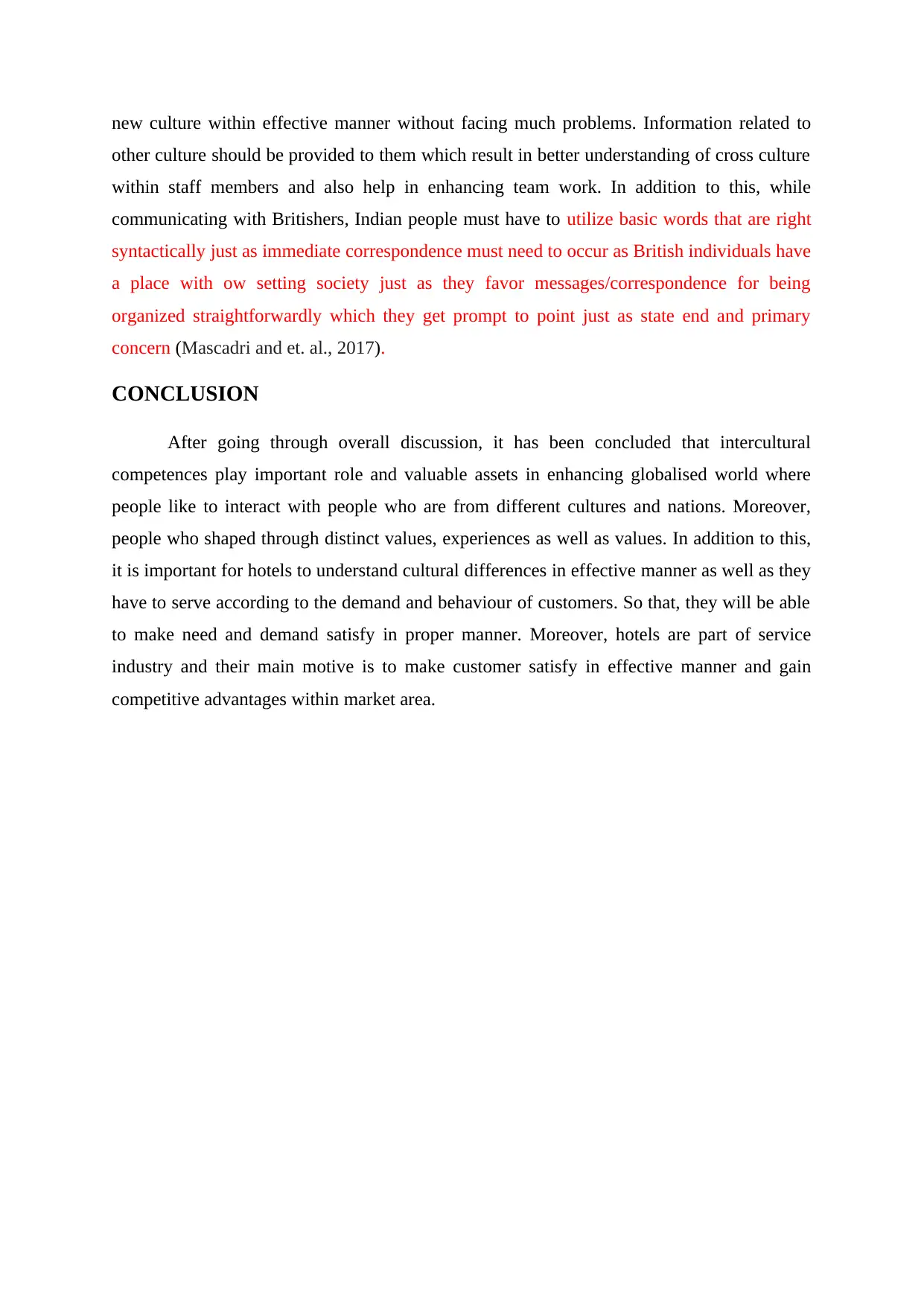
new culture within effective manner without facing much problems. Information related to
other culture should be provided to them which result in better understanding of cross culture
within staff members and also help in enhancing team work. In addition to this, while
communicating with Britishers, Indian people must have to utilize basic words that are right
syntactically just as immediate correspondence must need to occur as British individuals have
a place with ow setting society just as they favor messages/correspondence for being
organized straightforwardly which they get prompt to point just as state end and primary
concern (Mascadri and et. al., 2017).
CONCLUSION
After going through overall discussion, it has been concluded that intercultural
competences play important role and valuable assets in enhancing globalised world where
people like to interact with people who are from different cultures and nations. Moreover,
people who shaped through distinct values, experiences as well as values. In addition to this,
it is important for hotels to understand cultural differences in effective manner as well as they
have to serve according to the demand and behaviour of customers. So that, they will be able
to make need and demand satisfy in proper manner. Moreover, hotels are part of service
industry and their main motive is to make customer satisfy in effective manner and gain
competitive advantages within market area.
other culture should be provided to them which result in better understanding of cross culture
within staff members and also help in enhancing team work. In addition to this, while
communicating with Britishers, Indian people must have to utilize basic words that are right
syntactically just as immediate correspondence must need to occur as British individuals have
a place with ow setting society just as they favor messages/correspondence for being
organized straightforwardly which they get prompt to point just as state end and primary
concern (Mascadri and et. al., 2017).
CONCLUSION
After going through overall discussion, it has been concluded that intercultural
competences play important role and valuable assets in enhancing globalised world where
people like to interact with people who are from different cultures and nations. Moreover,
people who shaped through distinct values, experiences as well as values. In addition to this,
it is important for hotels to understand cultural differences in effective manner as well as they
have to serve according to the demand and behaviour of customers. So that, they will be able
to make need and demand satisfy in proper manner. Moreover, hotels are part of service
industry and their main motive is to make customer satisfy in effective manner and gain
competitive advantages within market area.
Paraphrase This Document
Need a fresh take? Get an instant paraphrase of this document with our AI Paraphraser
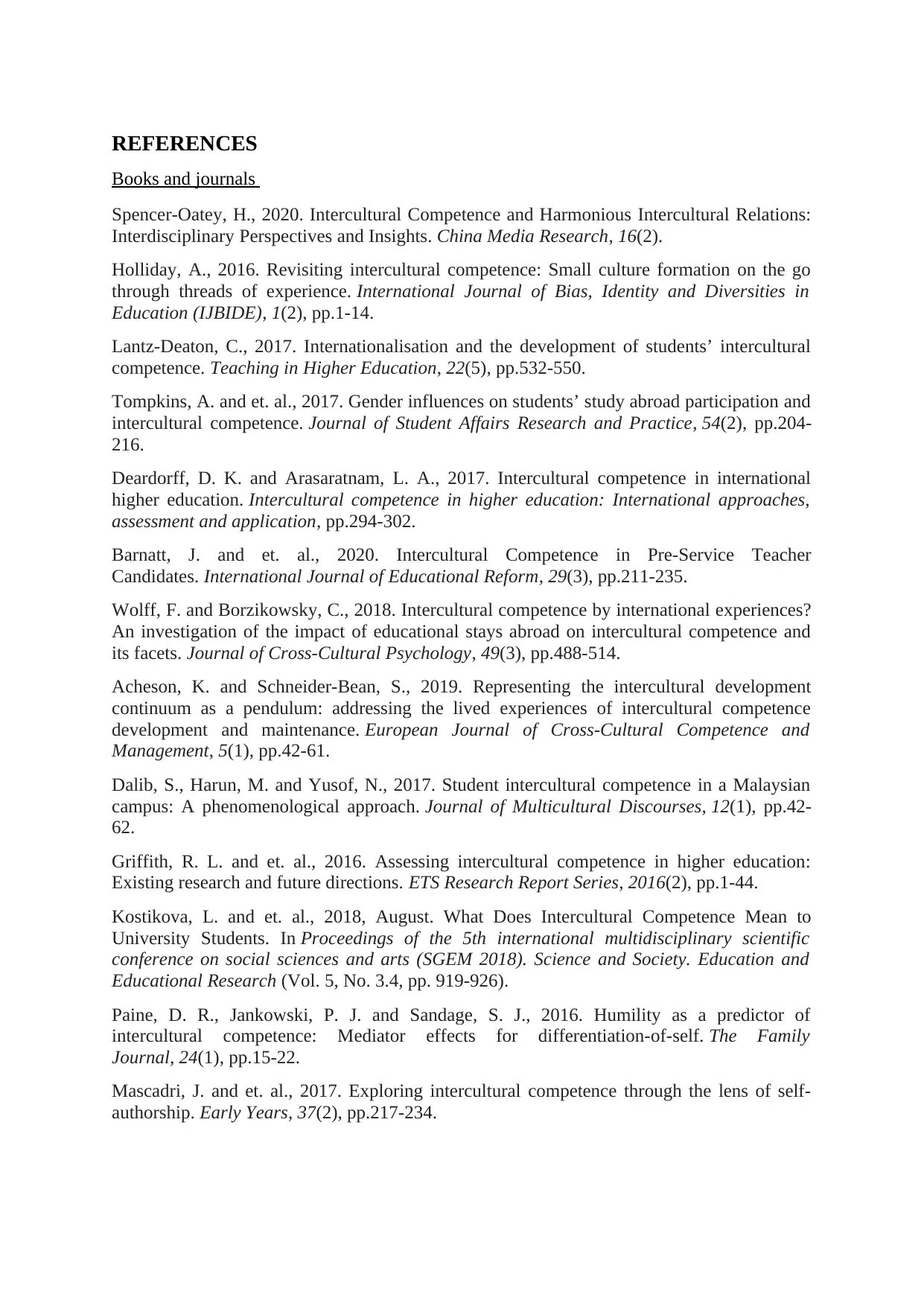
REFERENCES
Books and journals
Spencer-Oatey, H., 2020. Intercultural Competence and Harmonious Intercultural Relations:
Interdisciplinary Perspectives and Insights. China Media Research, 16(2).
Holliday, A., 2016. Revisiting intercultural competence: Small culture formation on the go
through threads of experience. International Journal of Bias, Identity and Diversities in
Education (IJBIDE), 1(2), pp.1-14.
Lantz-Deaton, C., 2017. Internationalisation and the development of students’ intercultural
competence. Teaching in Higher Education, 22(5), pp.532-550.
Tompkins, A. and et. al., 2017. Gender influences on students’ study abroad participation and
intercultural competence. Journal of Student Affairs Research and Practice, 54(2), pp.204-
216.
Deardorff, D. K. and Arasaratnam, L. A., 2017. Intercultural competence in international
higher education. Intercultural competence in higher education: International approaches,
assessment and application, pp.294-302.
Barnatt, J. and et. al., 2020. Intercultural Competence in Pre-Service Teacher
Candidates. International Journal of Educational Reform, 29(3), pp.211-235.
Wolff, F. and Borzikowsky, C., 2018. Intercultural competence by international experiences?
An investigation of the impact of educational stays abroad on intercultural competence and
its facets. Journal of Cross-Cultural Psychology, 49(3), pp.488-514.
Acheson, K. and Schneider-Bean, S., 2019. Representing the intercultural development
continuum as a pendulum: addressing the lived experiences of intercultural competence
development and maintenance. European Journal of Cross-Cultural Competence and
Management, 5(1), pp.42-61.
Dalib, S., Harun, M. and Yusof, N., 2017. Student intercultural competence in a Malaysian
campus: A phenomenological approach. Journal of Multicultural Discourses, 12(1), pp.42-
62.
Griffith, R. L. and et. al., 2016. Assessing intercultural competence in higher education:
Existing research and future directions. ETS Research Report Series, 2016(2), pp.1-44.
Kostikova, L. and et. al., 2018, August. What Does Intercultural Competence Mean to
University Students. In Proceedings of the 5th international multidisciplinary scientific
conference on social sciences and arts (SGEM 2018). Science and Society. Education and
Educational Research (Vol. 5, No. 3.4, pp. 919-926).
Paine, D. R., Jankowski, P. J. and Sandage, S. J., 2016. Humility as a predictor of
intercultural competence: Mediator effects for differentiation-of-self. The Family
Journal, 24(1), pp.15-22.
Mascadri, J. and et. al., 2017. Exploring intercultural competence through the lens of self-
authorship. Early Years, 37(2), pp.217-234.
Books and journals
Spencer-Oatey, H., 2020. Intercultural Competence and Harmonious Intercultural Relations:
Interdisciplinary Perspectives and Insights. China Media Research, 16(2).
Holliday, A., 2016. Revisiting intercultural competence: Small culture formation on the go
through threads of experience. International Journal of Bias, Identity and Diversities in
Education (IJBIDE), 1(2), pp.1-14.
Lantz-Deaton, C., 2017. Internationalisation and the development of students’ intercultural
competence. Teaching in Higher Education, 22(5), pp.532-550.
Tompkins, A. and et. al., 2017. Gender influences on students’ study abroad participation and
intercultural competence. Journal of Student Affairs Research and Practice, 54(2), pp.204-
216.
Deardorff, D. K. and Arasaratnam, L. A., 2017. Intercultural competence in international
higher education. Intercultural competence in higher education: International approaches,
assessment and application, pp.294-302.
Barnatt, J. and et. al., 2020. Intercultural Competence in Pre-Service Teacher
Candidates. International Journal of Educational Reform, 29(3), pp.211-235.
Wolff, F. and Borzikowsky, C., 2018. Intercultural competence by international experiences?
An investigation of the impact of educational stays abroad on intercultural competence and
its facets. Journal of Cross-Cultural Psychology, 49(3), pp.488-514.
Acheson, K. and Schneider-Bean, S., 2019. Representing the intercultural development
continuum as a pendulum: addressing the lived experiences of intercultural competence
development and maintenance. European Journal of Cross-Cultural Competence and
Management, 5(1), pp.42-61.
Dalib, S., Harun, M. and Yusof, N., 2017. Student intercultural competence in a Malaysian
campus: A phenomenological approach. Journal of Multicultural Discourses, 12(1), pp.42-
62.
Griffith, R. L. and et. al., 2016. Assessing intercultural competence in higher education:
Existing research and future directions. ETS Research Report Series, 2016(2), pp.1-44.
Kostikova, L. and et. al., 2018, August. What Does Intercultural Competence Mean to
University Students. In Proceedings of the 5th international multidisciplinary scientific
conference on social sciences and arts (SGEM 2018). Science and Society. Education and
Educational Research (Vol. 5, No. 3.4, pp. 919-926).
Paine, D. R., Jankowski, P. J. and Sandage, S. J., 2016. Humility as a predictor of
intercultural competence: Mediator effects for differentiation-of-self. The Family
Journal, 24(1), pp.15-22.
Mascadri, J. and et. al., 2017. Exploring intercultural competence through the lens of self-
authorship. Early Years, 37(2), pp.217-234.
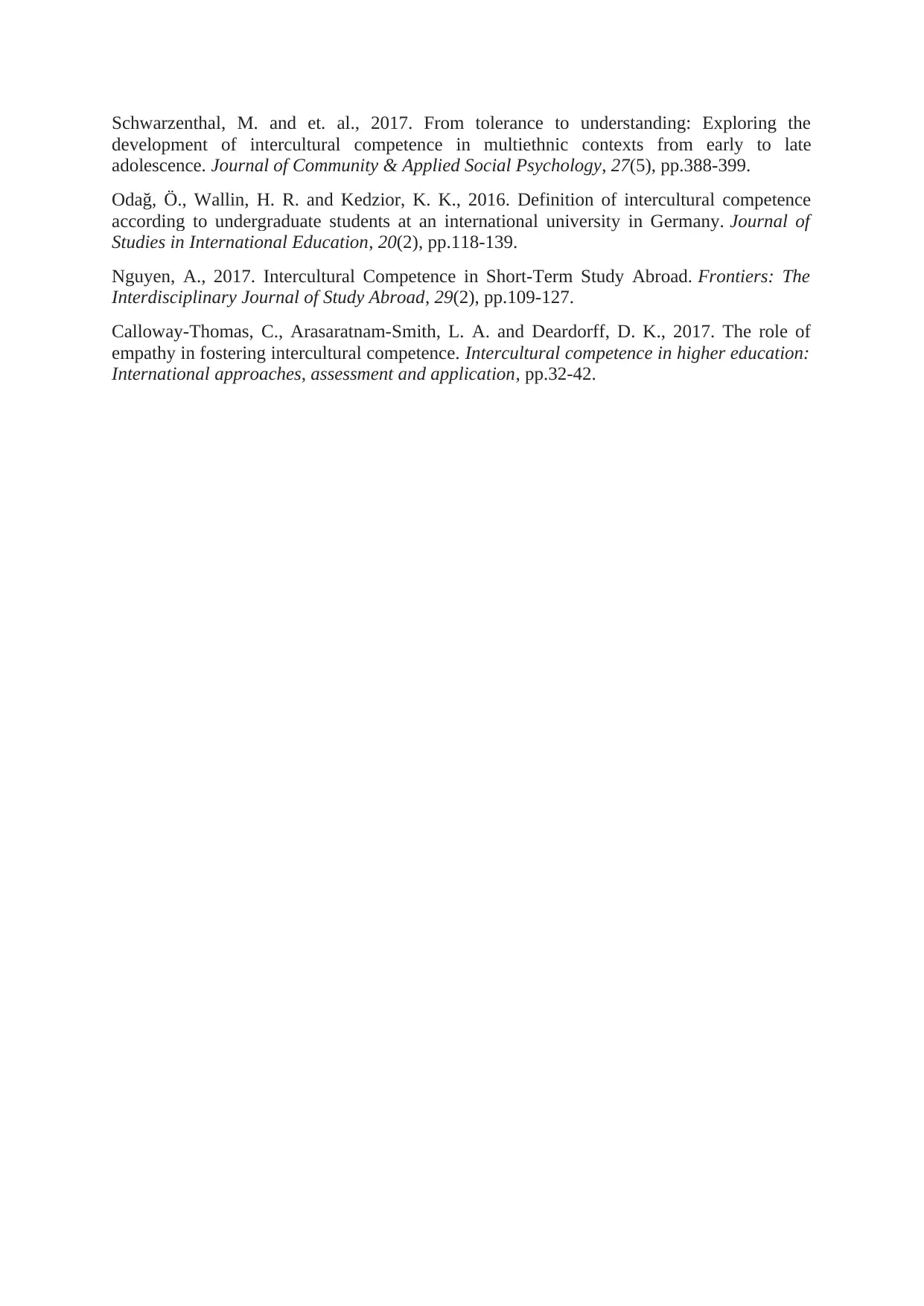
Schwarzenthal, M. and et. al., 2017. From tolerance to understanding: Exploring the
development of intercultural competence in multiethnic contexts from early to late
adolescence. Journal of Community & Applied Social Psychology, 27(5), pp.388-399.
Odağ, Ö., Wallin, H. R. and Kedzior, K. K., 2016. Definition of intercultural competence
according to undergraduate students at an international university in Germany. Journal of
Studies in International Education, 20(2), pp.118-139.
Nguyen, A., 2017. Intercultural Competence in Short-Term Study Abroad. Frontiers: The
Interdisciplinary Journal of Study Abroad, 29(2), pp.109-127.
Calloway-Thomas, C., Arasaratnam-Smith, L. A. and Deardorff, D. K., 2017. The role of
empathy in fostering intercultural competence. Intercultural competence in higher education:
International approaches, assessment and application, pp.32-42.
development of intercultural competence in multiethnic contexts from early to late
adolescence. Journal of Community & Applied Social Psychology, 27(5), pp.388-399.
Odağ, Ö., Wallin, H. R. and Kedzior, K. K., 2016. Definition of intercultural competence
according to undergraduate students at an international university in Germany. Journal of
Studies in International Education, 20(2), pp.118-139.
Nguyen, A., 2017. Intercultural Competence in Short-Term Study Abroad. Frontiers: The
Interdisciplinary Journal of Study Abroad, 29(2), pp.109-127.
Calloway-Thomas, C., Arasaratnam-Smith, L. A. and Deardorff, D. K., 2017. The role of
empathy in fostering intercultural competence. Intercultural competence in higher education:
International approaches, assessment and application, pp.32-42.
1 out of 9
Related Documents
Your All-in-One AI-Powered Toolkit for Academic Success.
+13062052269
info@desklib.com
Available 24*7 on WhatsApp / Email
![[object Object]](/_next/static/media/star-bottom.7253800d.svg)
Unlock your academic potential
© 2024 | Zucol Services PVT LTD | All rights reserved.





